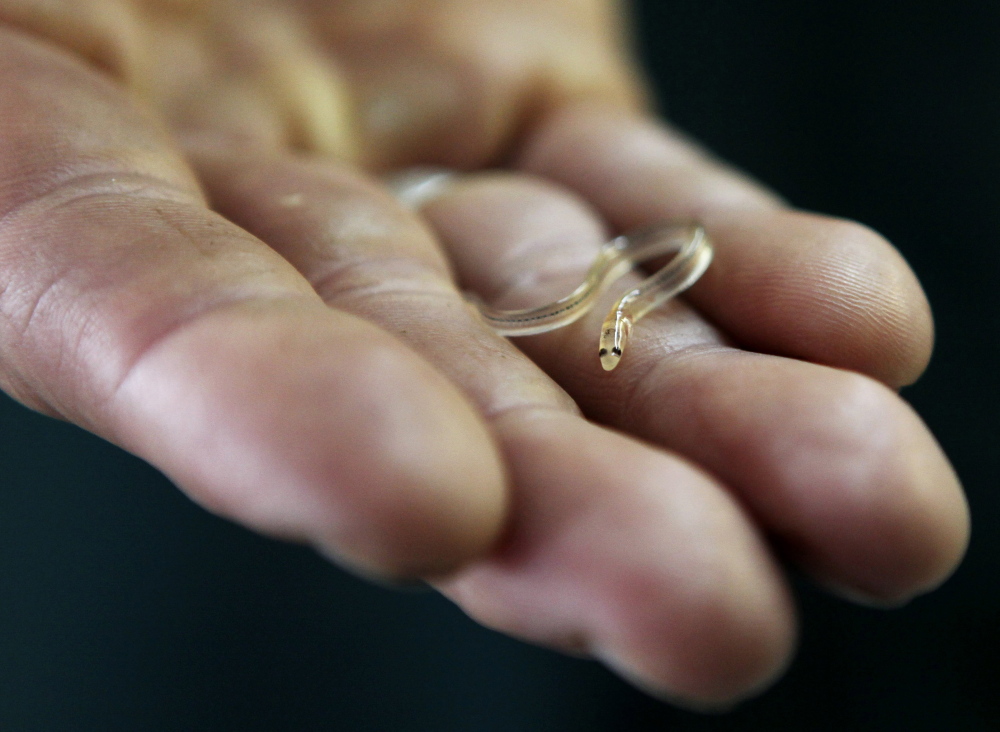He drove a super-sized pickup truck with “EEL WGN” plates, carried a bank bag stacked with cash and, as long as you had a bucket full of elvers, William “Billy” Sheldon didn’t care where they came from, according to documents unsealed Tuesday in U.S. District Court in Portland.
In a 42-page search warrant affidavit, federal wildlife investigators allege that for two years, Sheldon traveled between South Carolina and Maine buying and selling illegally harvested elvers, the tiny baby eels that fetch astronomical prices overseas.
Sheldon has not been charged in the case.
The sprawling investigation dates to 2012, and includes undercover agents posing as fishermen, clandestine eel deals made in truck-stop parking lots and secretly recorded conversations in which Sheldon flouted federal rules for the high-priced fishery, which bar the shipment of wildlife across state lines for the purposes of a sale, according to the affidavit.
“I could get in a jam if I know that eels that you’re selling are coming from another state,” Sheldon told an undercover investigator posing as an eel fisherman in 2013. “I don’t care where you got ’em, you have got a license and you are here. Fine, I’ll buy ’em and I’ll pay you for ’em.”
Elvers, also called glass eels, are sold overseas as seed stock for Asian aquaculture companies that raise them to maturity and sell them as food. Some end up back in America in restaurants as sushi.
Maine fishermen are by far the largest supplier of elvers in the United States.
The emerging case highlights how demand for eels in Asia has driven U.S. fishermen to chase the profits despite increasingly strict limits placed on the fishery by regulators. Fishermen in Maine caught 9,690 pounds of elvers last year at an average price of $874.52 per pound, according to state data.
A YEAR-OLD SEARCH WARRANT
The species remains in decline, and elvers are the subject of a federal review to determine if they should be placed on the endangered species list, which would shut down the fishery entirely.
The search warrant against Sheldon was filed in April 2014 and executed shortly after, but was not unsealed in court until Tuesday.
Walter McKee, Sheldon’s attorney, said he has known about the investigation for some time, but did not know why the affidavit was released now.
“We are going to be combing through it very, very carefully,” he said in a statement. “What is clear by all accounts is that there is a concern here only about a very tiny fraction of the total amount of eels that Bill Sheldon has dealt with over the past many years.”
Officials with the U.S. Department of Justice said only that the search warrant affidavit is part of an ongoing investigation into eel trafficking in several states along the East Coast.
The investigation into Sheldon began in February 2012, when the coordinator for elver fishing permits in South Carolina received a tip from one of Sheldon’s associates about his practices.
South Carolina is the only state besides Maine that allows commercial elver fishing, but it allows only 10 commercial elver fishing licenses annually, and allows fishing in a single waterway, the Cooper River. By comparison, hundreds of licenses are permitted each year in Maine, with fewer restrictions on the location.
Sheldon is a licensed eel fisherman and dealer in Maine and was licensed in South Carolina until the laws there were changed to bar out-of-state fishermen. He and his wife, Cindy, operate Kennebec Glass Eels from their Woolwich home. Sheldon did not return a call for comment Tuesday.
UNDERCOVER OPERATION
According to the affidavit, Sheldon split his time between Woolwich and Moncks Corner, South Carolina, a town north of Charleston on the Cooper River.
When eel fishing did not work out for Sheldon’s associate on the Cooper, Sheldon suggested the person try fishing elsewhere, and provided an alternate location, according to the affidavit.
Undercover agents for U.S. Fish and Wildlife posing as South Carolina eel fishermen then made contact with Sheldon, who suggested the agents also fish illegally in another location. When the agents returned to sell the elvers to Sheldon, they told him they were harvested from illegal locations. Each time, Sheldon falsified paperwork to indicate that the eels were caught legally, according to the documents.
The government says it sold him roughly $49,000 worth of elvers that agents portrayed as being obtained illegally, although those elvers were actually obtained legally.
This method continued in Maine as well, where Sheldon maintained an office at an Ellsworth motel.
Agents then observed Sheldon drive north from South Carolina to a rest stop in Virginia, where he would sell the eels to an exporting company from Philadelphia, the affidavit states.
In 2013, Sheldon advised the undercover agents on strategies to avoid law enforcement, helping them construct plausible explanations for why they were traveling out of state with South Carolina elvers, according to the search warrant. One strategy he suggested was to keep a distinctive buoy in the vehicle that matched one on nets in the Cooper River, so if police or wardens were to check, it would appear that the agents had been fishing legally.
“The best thing, of course, is to not get caught,” Sheldon told the agents.
Send questions/comments to the editors.




Success. Please wait for the page to reload. If the page does not reload within 5 seconds, please refresh the page.
Enter your email and password to access comments.
Hi, to comment on stories you must . This profile is in addition to your subscription and website login.
Already have a commenting profile? .
Invalid username/password.
Please check your email to confirm and complete your registration.
Only subscribers are eligible to post comments. Please subscribe or login first for digital access. Here’s why.
Use the form below to reset your password. When you've submitted your account email, we will send an email with a reset code.